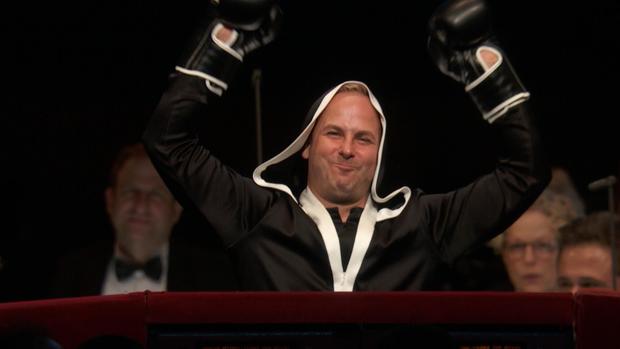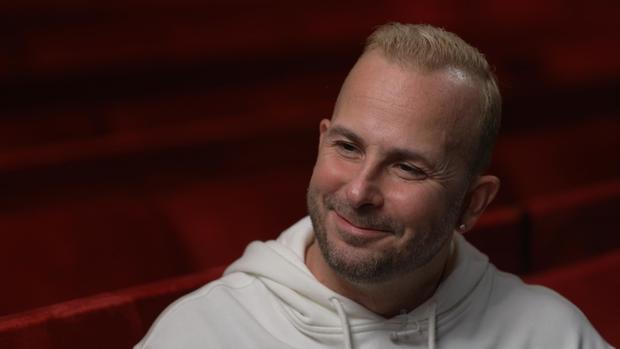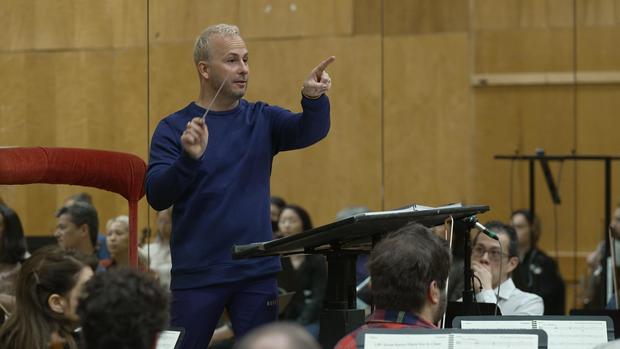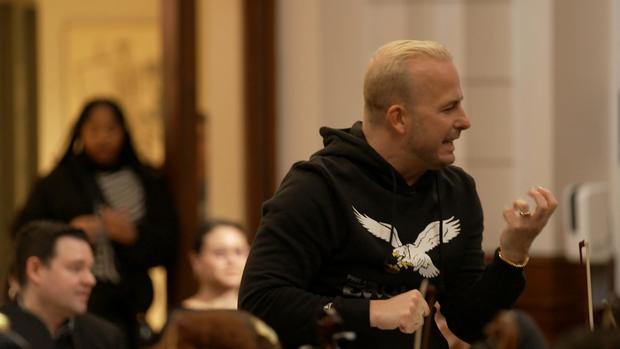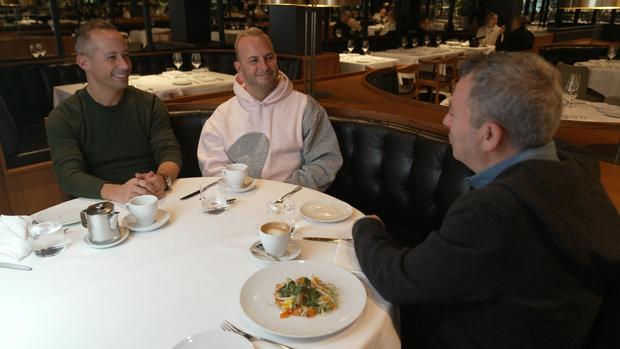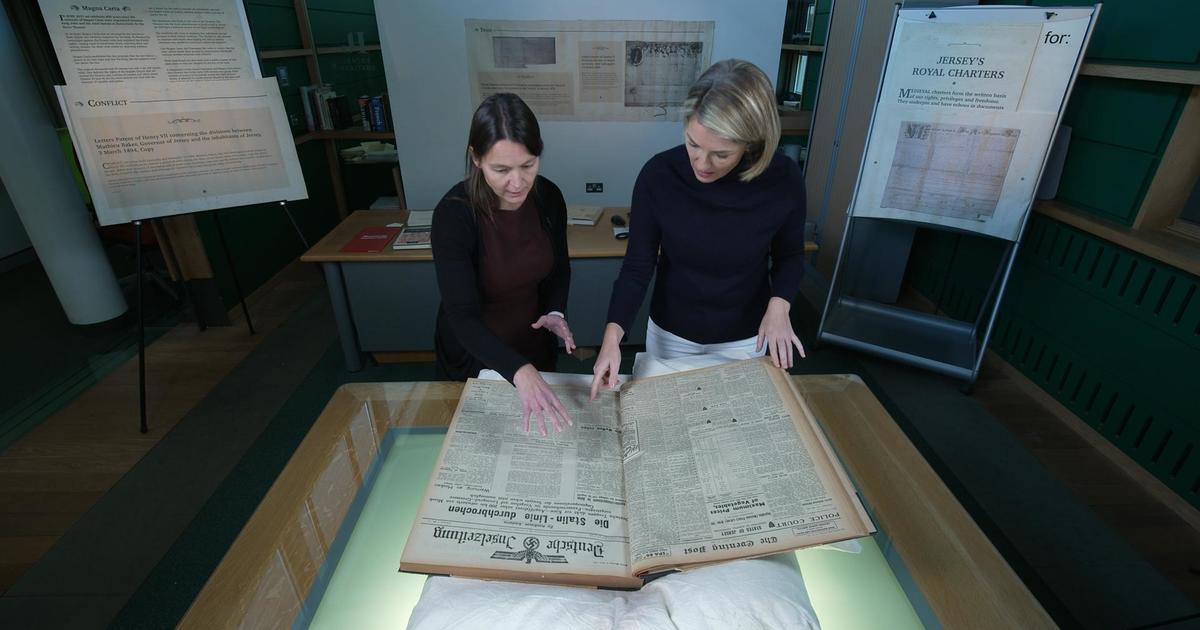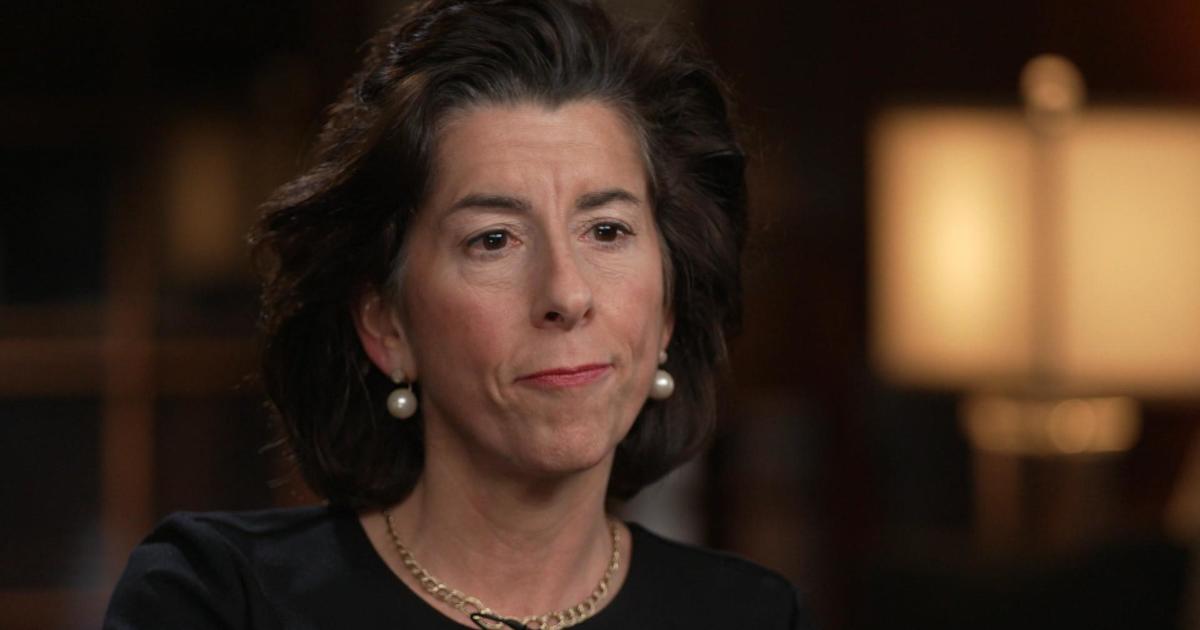Conductor Yannick Nézet-Séguin wants to open world of classical music, opera to new audiences
This is an updated version of a story first published on May 14, 2023. The original video can be viewed here.
Yannick Nézet-Séguin is a conductor operating at triple tempo, at once the director of three major orchestras—in Philadelphia; in his hometown of Montreal and at the Metropolitan Opera in New York, which has pinned on him the hopes for rebounding from financial crisis and the bold revamping of its artistic mission. Not that you'll catch Nézet-Séguin sweating it. At 48, he's obliterating the stereotype of the strict, unapproachable maestro - joyfully keeping his musicians in time, his hair bleached platinum blonde and a smile all but welded to his face. Known as much for his versatility as his virtuosity, Nézet-Séguin, as we first told you in May, is reimagining the role of the modern orchestra; and its place in the soundtrack of the modern city.
You'd be forgiven for double-checking your ticket to make sure you weren't at Madison Square Garden. This is New York's Metropolitan Opera.
And in this corner, the maestro, Yannick Nézet-Séguin, only the third music director in the Met's 140-year history.
He's conducting a jazz-infused opera about a real-life boxing champion of the 1960s and 70s. All this is a radical key change from the standard Met lineup of Puccini and Verdi and Wagner.
Nézet-Séguin's eyes reach musicians in the pit and vocalists on stage, seemingly all at once. The bounce in his baton consecrates every note.
Yannick Nézet-Séguin: It's the cathartic moment where, "Oh my god, this is so amazing. This is so impressive. This is so intense. This is so emotional." And this cathartic experience we feel transformed as a different person before and after listening to these pieces.
Jon Wertheim: There seems to be something sacred about your making music. Am I overstating that?
Yannick Nézet-Séguin: No. No, you're not. I try never to take myself too seriously. But music has to be taken seriously.
A pianist by training who's conducted the great philharmonics of Europe, Nézet-Séguin brings his sensibility to bear up and down the Eastern Seaboard. In Philadelphia, he is the current custodian of what's been a world-renowned orchestra for more than a century. We visited in February, as the city celebrated the contract extension through 2030 of a maestro known to all by his first name.
That morning, Yannick and his musicians made the pilgrimage up the famed Rocky steps, clad in Eagles gear. He sees the orchestra - not unlike a sports team - as an instrument of cohesion in the community.
Yannick Nézet-Séguin: Hey…. hi everyone…. hi!
In the afternoon, Nézet-Séguin stopped by Philly's premier performing arts high school to guest conduct the students.
Yannick Nézet-Séguin: I think if we were to agree to bite even more in every note like TA TA TA TA TA TA TA TA TA TA
Yannick Nézet-Séguin: That's it, that's what I'm talking about!
Four hundred and fifty miles due north, back home in Montreal, they speak his language in more ways than one. He has a lifetime contract with the Orchestre Métropolitain. Nézet-Séguin has led these musicians for more than 20 years; that's his husband Pierre Toureville on viola. The depth of his connection here produces hypnotic sound. Listen to this, a rehearsal of Sibelius' "Fifth Symphony."
Some weeks Yannick leads performances in all three cities. Just last Saturday, he conducted a matinee in New York and the evening program in Philly. Then again, what is a conductor if not someone able to synchronize?
Yannick Nézet-Séguin: I can't deny that it's a very demanding schedule. And even the word "schedule" if, should I ever retire, I want to ban that word from my life.
Jon Wertheim: Do you have a favorite child among the three orchestras you conduct?
Yannick Nézet-Séguin: You cannot ask me this.
Yet one child in particular—and isn't this always the case?—demands extra attention and TLC…
Yannick Nézet-Séguin: Can we have more importance in the third….
At the Met, the country's largest performing arts institution, we watched him wrangle 250 musicians and singers for a production of Wagner's "Lohengrin," a stalwart opera that gave us the "Bridal Chorus." And Nézet-Séguin's interpretations do right by the masters.
Yannick Nézet-Séguin: What I want is to respect what Wagner wrote in the score.
Yannick Nézet-Séguin: So it's very poetic and magical. What's really individual is me being completely at the service of the composer.
Yannick took over the podium here in 2018, after his predecessor was fired for allegations of sexual misconduct. Facing weak ticket sales and perpetually strapped for cash, the Met has had a hard time rebounding from COVID and has dipped into its endowment to cover around 10% of its $300 million operating budget.
They've tried courting a younger, more diverse crowd here before, but Nézet-Séguin is doing it prestissimo, speeding up the tempo of change. He's betting that new composers and contemporary operas - some adapted from bestselling books and Hollywood hits - will bring in a wider audience and shore up the bottom line.
And early results suggest he's right.
A recent premiere of the opera "Fire Shut Up in My Bones"— based on a memoir by journalist Charles Blow and composed by jazz legend Terence Blanchard - sold-out and outsold Verdi's classic "Rigoletto" here that season. What's more, half the seats were filled by first-time Met goers.
Yannick Nézet-Séguin: It's great, such a success. And yet I'm thinking that means that all of these people never felt compelled, or, dare I say, welcome to come here. And that is my mission.
Jon Wertheim: First timers were 50%. You saw that as both a triumph but also sounds like an-- an indictment.
Yannick Nézet-Séguin: Mostly it's a tremendous encouragement to continue in that vein.
The Met will put on 17 new and recent works over the next five seasons - this at a place that once went near decades without staging a new opera. This spring brought "Champion," another Terence Blanchard composition based on the complicated life of Emile Griffith, a bisexual prizefighter.
Jon Wertheim: What can't you write an opera about?
Yannick Nézet-Séguin: Nothing.
Jon Wertheim: How do you thread that needle between-- experimenting and bringing in new audiences, but also not upsetting the traditionalists?
Yannick Nézet-Séguin: The truth is I'm not necessarily concerned about not upsetting traditionalists. I think people who love our art form are still gonna love it because we're still gonna play some Puccini and Verdi. To me it's-- it's never about not upsetting. And if some people are upset, well, too bad. They just don't have to come to everything we do.
And that's about as prickly as you'll hear him get…Beyond Yannick's musicianship, his real hallmark might be his light touch.
Yannick Nézet-Séguin: Ok, let's do it one more time.
Take this rehearsal for "Champion," the first time the orchestra, rhythm section, and singers played the piece together…but also that rare collaboration between a conductor and a living composer.
Terence Blanchard: He gets it.
Terence Blanchard, a seven-time Grammy winner, is the first Black composer in the Met's history.
Terence Blanchard: He gets the story. He gets the whole notion of bringing these different styles of music together.
Terence Blanchard: One of the rehearsals with the orchestra, he said, "Listen, don't follow me, listen to the drums." Most conductors don't do that.
We saw firsthand Yannick's responsiveness when soprano Latonia Moore asked him to slow things down.
Latonia Moore: Can we start again? It's too fast. It's too fast. Can we do it a hair slower? I just want to really get everything out.
Yannick Nézet-Séguin: Yeah. So, right from the bass.
Jon Wertheim: Is there a worry, though, that your authority might be undercut by all these good vibes?
Yannick Nézet-Séguin: I think it's the old concept of authority, which is because-- I say so and because I can fire you-- I'm gonna tell you what to do. That's not working anymore. And I will go even further. Even the masters of the past, Toscanini, for example, fantastic musician. Of course I respect a lot of this. But you can hear with some recordings with Toscanini, especially with singers. You could hear the fear in their voice. And to me, that's not expressive.
Jon Wertheim: You can discern that?
Yannick Nézet-Séguin: Oh yeah. Oh, I'm sure you could. Like they're trembling, because they fear. Because already to open your mouth on the stage is already nerve-wracking. If you have a conductor who is waiting for you to fail, it's gonna be even more mer-- nerve-wracking. The music doesn't win.
Yannick Nézet-Séguin: The music wins when everybody feels free to express who they are.
Yannick found that freedom for himself as early as grade school; here he is leading an imaginary orchestra in front of classmates. He studied at the conservatory in Montreal, a music town with a church on every corner. He led the church choir in his teens and trained his ear in less formal ways, too.
Yannick Nézet-Séguin: I would go to a record store and buy CDs and discover repertoire after repertoire, every symphony by Brahms, every symphony by Beethoven, by Bruckner, by Mahler. I wanted then to hear every version and buy every version of every symphony. And I'm not shy to say that it-- it's-- it's shaped a lot of who I am as a musician. Because eventually it became a collection of, like, 12,000 CDs.
Last winter, we visited his parents at Yannick's childhood home; the kind of folks who keep every clipping.
Jon Wertheim: Yannick told us when he was a boy he collected thousands and thousands, maybe 10,000 CDs.
Serge P. Séguin: Yeah--
Claudine Nézet: Oh, more than that.
Serge P. Séguin: Yeah, absolutely--
Jon Wertheim: He wasn't exaggerating?
Claudine Nézet: Oh, no, no, no--
Serge P. Séguin: No, no, no.
Claudine Nézet: Not at all.
Serge P. Séguin: Not at all.
Claudine Nézet: Not at all.
Jon Wertheim: Where did you put them?
Claudine Nézet: He made the shelves for him.
And it was his mom who managed Yannick's schedule throughout his 30s, as he worked the international circuit - London, Vienna, Rotterdam - guest conducting 100 orchestras.
He made his Met debut in 2009; persistence paying off. And if today he's living the dream, he's also conscious to live his life…he and Pierre go on the road together. We met them at a spot in Old Montreal, where they had celebrated their wedding. They make a point of going out after every performance.
Yannick Nézet-Séguin: Friends, family, members of the orchestra--
Pierre Tourville: Colleagues--
Yannick Nézet-Séguin: Colleagues, some people together to eat well and drink a little.
Of all the musical moments in the couple's history, we were surprised when Yannick highlighted this one: the time Pierre and Céline Dion serenaded him on a popular Quebec talk show, a kind of musical "This Is Your Life."
Yannick Nézet-Séguin: Of course, it's one of the most moving moments of my life.
Pierre Tourville: Not everybody can say that they've sung a--
Yannick Nézet-Séguin: Duet--
Pierre Tourville: --duet with Céline--
Jon Wertheim: You've had a duet--
Pierre Tourville: --Dion--
Jon Wertheim: --with Céline Dion.
Pierre Tourville: Bocelli and Barbra Streisand and yeah, that's--
Yannick Nézet-Séguin: And Pierre--
Pierre Tourville: --Pavarotti--
Yannick Nézet-Séguin: And Pierre. And Pavarotti.
Jon Wertheim: Wow
Maybe it's a hard turn from Céline to the Met for most conductors; not so for Yannick Nézet-Séguin. Yes, he takes music seriously…but resists being too precious about it.
Yannick Nézet-Séguin: You have to trust the acoustics.
He's too busy smudging boundaries that have long kept some audiences away from classical music and opera.
Yannick Nézet-Séguin: I would love that when I finish my time on Earth that no one ever says again, "Oh, classical music is not for me. It's for the educated. It's for the rich. It's for the white. Whatever it is, you know, I want everyone to feel, "Oh yeah, I could like it, some of it. I don't like Mozart but I like Blanchard. Fine, but at least you feel that you could go there because there would be something for you.
What would Puccini and Verdi and Wagner make of all this? One suspects they would join in the applause. They, after all, were once musical boundary-pushers, too.
Produced by Nathalie Sommer and Kaylee Tully. Broadcast associate, Elizabeth Germino. Edited by Craig Crawford.
